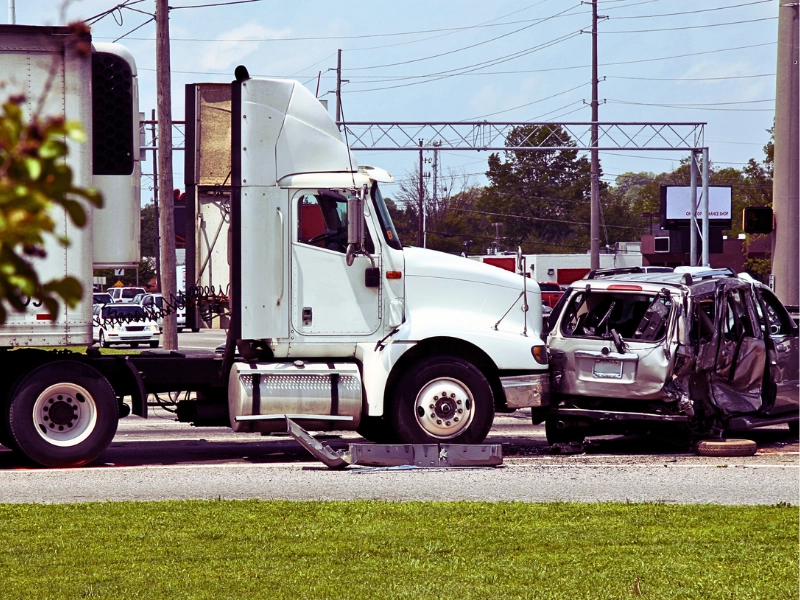When truck accidents result from poor maintenance, victims and their loved ones may be able to seek compensation from mechanics, trucking companies, and other parties responsible for negligent maintenance.

If negligent maintenance caused an accident and subsequent injuries, call Young, Reverman & Bolotin at 513-400-0000 to schedule a free consultation with a Cincinnati truck accident attorney.
Table of Contents
Common Truck Accidents Caused by Poor Maintenance
There are several factors in semi-truck crashes that can result from maintenance failures, including:
Brake Failure
According to the Federal Motor Carrier Safety Administration (FMCSA), brake-related issues account for around 29% of large truck accidents across the country, making them among the most frequent forms of mechanical failure in these collisions.
Tire Failure
Wear, improper pressure levels, and overloading can cause tire blowouts, which can subsequently cause truck drivers to lose control of their vehicles and get into an accident. Tire failure is also one of the main causes of jackknife truck accidents, along with brake failure.
Incorrect Trailer Attachment
Another type of mechanical failure can result from the improper attachment of trailers to semi-trucks, which can lead the trailer to lose balance and possibly detach or, especially when carrying an imbalanced load, it can cause truck rollover accidents.
Broken Windshield Wipers
Drivers could suffer from inadequate visibility on the road in rain and snow without functioning windshield wipers, making it critical for truckers to ensure their wipers are working correctly before driving, particularly if they expect to drive in inclement weather.
Failed Transmissions
In many cases, transmission failure in trucks is the result of too much weight. Transmissions can handle a certain amount of weight, but semi-trucks often surpass this weight limit with overloaded trailers. In some instances, transmissions could still experience premature wear even after passing inspection.
Determining Liability After a Truck Accident Caused by Poor Maintenance
Multiple parties could bear commercial truck liability if negligent maintenance was the cause of a truck accident.
These parties may include:
- Truck Drivers: Truck drivers may need to inspect their vehicles before or after a trip or get commercial truck maintenance if there are signs of an issue.
- Trucking Companies: The companies that hired the truck driver may also be liable if they neglect to ensure their fleets are in good shape with routine and emergency maintenance. Additionally, they could be responsible for negligent hiring practices, if a driver is unqualified to operate the vehicle, or for providing inadequate training.
- Mechanics: Maintenance contractors and mechanics may be responsible if they fail to notice and properly address mechanical issues that they should have known about upon inspection.
- Manufacturers: Parts or vehicle manufacturers could be liable if their products have any critical manufacturing or design defects that cause their products to malfunction even when used properly.
- Cargo Loaders: These individuals might be responsible for a truck accident if they improperly load cargo, such as failing to ensure the load is balanced or adding too much cargo to the point where it surpasses the vehicle’s weight limit.
More than one of these parties might be liable, depending on the circumstances leading up to the accident.
How to Prove Negligent Truck Maintenance Caused Your Accident
If you want to build a viable case against a liable party for negligent maintenance that led to an accident, you must prove liability based on the four elements of civil liability.
The first thing you must prove is that the liable party owed you a duty of care by properly maintaining a vehicle. Next, you will need to show that this party breached that duty of care through maintenance failures. Then you will need to show that this breach of duty led to an accident and subsequent injuries, along with the fact that these injuries led to calculable, compensable damages. In proving fault, you will also need to gather and organize many pieces of evidence that support your claim or lawsuit.
There are multiple pieces of evidence that could contribute to these cases, such as:
Medical Bills and Records
When seeking treatment for injuries, individuals should keep copies of medical bills and records. Timeliness is also essential here, as the longer you take to seek treatment for your injuries, the more difficult it will be to prove that the accident was the cause.
Police Reports
If injuries or extensive property damage result from an accident, the people involved will be legally obligated to contact law enforcement. Once they arrive at the scene, police officers could draft a police report detailing the accident, possibly designating fault.
Witness Statements
Eyewitness testimony from people involved could also help strengthen your case and support other evidence gathered.
Bring all of this evidence to a Cincinnati truck accident lawyer who could review the facts of your case and determine your legal options. They could also help you collect evidence you are unable to obtain on your own.
For help with a lawsuit or claim, turn to the attorneys at Young, Reverman & Bolotin, and contact us today to schedule a free consultation.
FAQs
What Mechanical Failures Can Cause a Truck Accident?
A wide range of mechanical failures can lead to an accident due to poor maintenance, such as brake failures, tire blowouts, lighting problems, broken windshield wipers, transmission failure, and rear guard failure.
What Is Considered Mechanical Failure on a Vehicle?
Mechanical failure occurs when a component or system breaks down to the point where it can no longer function as intended, usually after periods of wear and tear resulting from insufficient maintenance. However, manufacturing and design defects could also lead to mechanical failure.
How Often Do Mechanical Problems Cause Truck Accidents?
Data from the FMCSA found that nearly 40% of truck accidents result from some type of mechanical failure, including brake, tire, and trailer issues.

